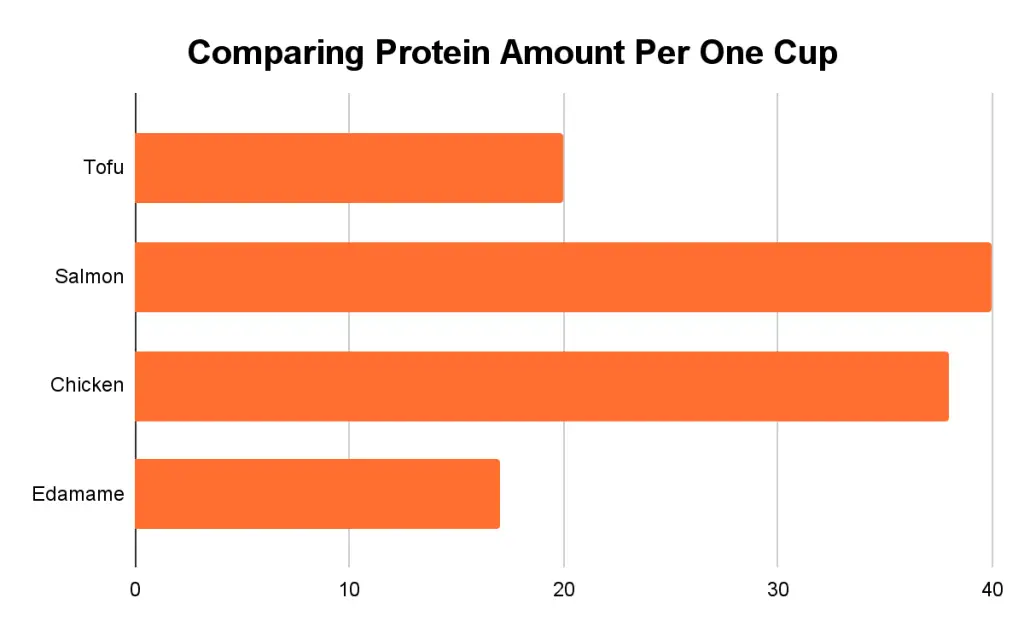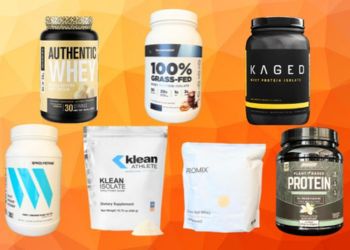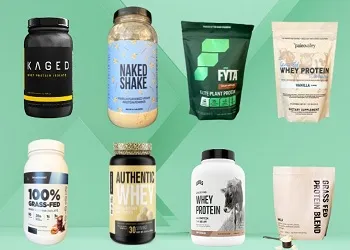How do I know if I need more protein? How much is best? Protein is important for supporting bodily processes and functions.
This article is a comprehensive outline of protein, including its role in the body, its importance, how to calculate how much protein per day to prioritize, and how to know if you need more!
Quick Takeaway:
- Men and women have the same required protein intake at 0.8 grams (g) of protein per kilogram (kg) of body weight.
- There are different factors, such as pre-existing health conditions and activity level, that influence protein intake for each individual.
- Protein plays a vital role in daily functions in the human body; without it, our body and its systems would be unable to function correctly.
- The highest protein sources are most commonly animal foods, such as lean meats, though plant-based proteins, like tofu and beans, are also good protein sources.
Table of Contents
How Much Protein Do You Need a Day?
So, how much protein do you need a day? The requirements for men and women are practically the same. However, the calculated number for each individual will come out differently due to age, weight, height, and activity level.
Daily Protein Intake For Women
According to the International Sports Sciences Association (ISSA), the general recommended protein intake for women is at least 0.8 grams of protein per kilogram of body weight. This protein intake recommendation is only 10% of a woman’s daily calorie intake.
Protein intake can vary per woman depending on pre-existing health conditions, weight, height, age, and activity levels.
Daily Protein Intake For Men
The daily protein intake for men is the same as for women. It comes to a minimum of 0.8 grams of protein per kilogram of body weight.
Remember that this recommended intake is for sedentary individuals to meet the general protein intake requirements to support overall health and quality of life.
Factors Influencing Protein Intake

Different factors can influence protein intake. It’s important to keep in mind that protein intake will vary per individual, as every person’s body is different, whether it be due to health, weight, age, height, or activity level. Keep reading to learn more about the factors influencing protein intake and what you need to look for when calculating yours!
Health Conditions
Certain health conditions require differing protein intakes when compared to healthy individuals.
One such example is older adults with sarcopenia. Through a pooled analysis, it was discovered that older adults were more likely to consume a drastically decreased amount of protein when compared to non-sacropenic individuals. A reduction in skeletal muscle protein synthesis is associated with aging, emphasizing the need to promote sufficient protein intake and resistance exercise to maintain muscle mass to support health and reduce injury.
During illness, protein intake is especially vital to support the immune system in building antibodies and promoting wound healing. One study evaluated the change in protein intake needs in times of infection. It stated that following infection, protein needs increase by 20-30%, or 30-50% in diarrhea cases, while in a recovery period.
Age
As humans age, the requirements for protein intake increases to decrease the onset of sarcopenia and skeletal muscle mass loss. The research proposes that older adults require more protein than the present RDA requirement suggests.
| Current RDA For Protein Intake | |
| Age | Per kg of Body Weight |
| Infants (7-12 months) | 1.2 g |
| Toddlers (1-3 years) | 1.05 g |
| 4-8 years | 0.76 g |
| 9-13 years | 0.76 g |
| 14-18 years (boys) | 0.73 g |
| 14-18 years (girls) | 0.71 g |
| 19-64 years | 0.8 g |
| 65 years and on | 1.0 g |
Activity Level
According to the American College of Sports Medicine, a person who exercises and weight trains regularly should be consuming anywhere from 1.2-1.7 grams of protein per kilogram of body weight per day. This increase in protein intake supports an increase in muscle mass and promotes sufficient muscle recovery.
The International Society of Sports Nutrition recommends for individuals who participate in endurance exercise anywhere from 1-1.6 g per kg of body weight per day. This varies depending on the intensity and duration of the exercise in question. Strength and power exercise regimens require a protein intake of 1.6-2 g per kg of body weight daily.
Gender
It was observed in studies that women consumed higher intakes of protein when in the luteal phase (premenstrual) when compared to the follicular phase (postmenstrual). Currently, more studies need to be done to better examine the reasons behind this as many studies focus more on men than women for protein intake research.
During cases of pregnancy, recommended protein intake for women increases by the second and third trimesters to 1.1 g per kg of body weight per day. The significant increase in protein intake is primarily due to the growth of maternal tissues for the fetus and placenta.
Body Weight
The recommended daily protein intake is widely dependent on body weight.
Calculations determining an individual’s daily protein intake depend on factors such as body weight, gender, activity level, and age. Any of these attributes can alter a person’s protein intake results.
The reason is that protein promotes a certain amount of nitrogen balance in the body to support lean body mass. One study explained nitrogen balance as translating to the difference in nitrogen intake and loss of nitrogen, reflecting the loss or gain of total body protein. This relationship signifies the body’s protein intake and losses, with negative nitrogen balances associated with protein-energy malnutrition (PEM).
An Overview of Protein – What Is It & Why Is It Important?

Protein is a crucial component of life, necessary for everyday functions of the human body. Without protein, the body’s system would stop functioning properly, and quality of life would soon deteriorate. Continue reading to learn more about the importance of protein and why you should incorporate it into each meal!
What Is It?
Protein is a collection of complex molecules vital for supporting structure and other functions in the human body. It is known as a macronutrient, sometimes shortened to “macros,” that the body needs in large amounts to function properly.
Amino acids are known as the building blocks of protein. Oxygen, nitrogen, and carbon comprise most of the protein, linking together to provide the structure for the macronutrient.
Why Is Protein Important?
There’s a reason why daily protein needs are consistently stressed in the health and fitness field. The health benefits associated with protein are vast, helping to support muscle growth and lean muscle mass.
Since protein contains amino acids, these building blocks promote structure within the body. This structure is vital for supporting the growth and repair of bones, muscles, and cells.
Proteins Are Responsible For:
- Transcribing and replicating DNA
- Producing other proteins
- Controlling cell division and metabolism
- Transporting information in and out of the cells
Risks of Protein Deficiency
There is a reason why daily protein intake is emphasized so heavily. Without getting enough protein in our diets, there comes the risk of protein deficiency.
Low protein intake is associated with health risks such as stunted growth or development in children, flaky skin, and infections. Consuming high-protein foods like meat, Greek yogurt, grains, and nuts can reduce adverse health effects from protein deficiency.
Risks of Protein Deficiency:
- Edema
- Brittle nails
- Fatty liver
- Muscle loss
- Bone fractures
- Infections
- Stunted growth
Risks of Protein Surplus
Like anything in excess, too much protein consumption can harm the body.
According to research, excessive protein intake is believed to place a metabolic burden on the liver, kidneys, and bones. Though high protein diets are often associated with strength, muscular hypertrophy, and maintenance of lean muscle mass in athletes and fitness enthusiasts, prolonged high protein intake has been linked to kidney damage and bone mineral loss.
Risks of Protein Surplus:
- Kidney disease
- Elevated blood lipids
- Coronary heart disease
- Increased cancer risk
Best Sources of Protein & Essential Amino Acids
There are many protein-rich foods that are excellent protein sources to boost intake and promote better health. Plant foods, like whole grains, and animal foods, like lean meats, are all great sources of essential amino acids and part of a healthy diet.
Though processed supplements, like all the protein bars and powders, are widely popular foods promoting higher protein intake for fitness enthusiasts and athletes, they may not be the healthiest protein options. Balancing fresh, whole foods full of important nutrients like amino acids, vitamins, and minerals, is vital for supporting the body and its many functions.
As shown in the graph below, animal foods, such as lean meats, contain higher amounts of protein than plant proteins. There are great sources of protein from plant sources to choose from for plant-based diets, such as edamame and tofu.

Source: Everflex Fitness 2024
How to Calculate Grams of Protein Per Day
Suppose you want to consume enough protein daily to support lean body mass and health. In that case, we recommend following the general guidelines of RDA for protein requirements.
How to Calculate Protein Per Day:
- If the daily recommended intake is 0.8 grams of protein per kilogram of body weight or 0.36 grams per pound, multiply your weight in pounds by 0.36.
- The final result is the amount of protein you should be consuming each day.
FAQs
When is the best time to consume protein?
There is no definite answer for the best time to consume protein, let alone for improving muscle mass gains. One study examined that consuming 40 grams of protein before bedtime resulted in higher rates of muscle protein synthesis when paired with a 12-week resistance training program.
What does 15–30 grams of protein in whole foods look like?
This can look vastly different depending on the choice of food. For example, an egg and bean burrito for breakfast surmounts about 18 grams of protein. Three ounces of white meat chicken breast paired with half a cup of vegetables and half a cup of brown rice comes to about 25 grams of protein.
Where does protein come from?
Protein is sourced from foods such as meat, eggs, vegetables, nuts, and seeds. It comprises amino acids, which act as the building blocks of protein to establish its structure.
Do I really need 100 grams of protein a day?
The amount of protein you need a day differs per person. It is determined by your activity level and age, with most adults needing at least 0.8 g per kg of body weight. This protein intake influences daily functions, muscle recovery, and cell growth.














